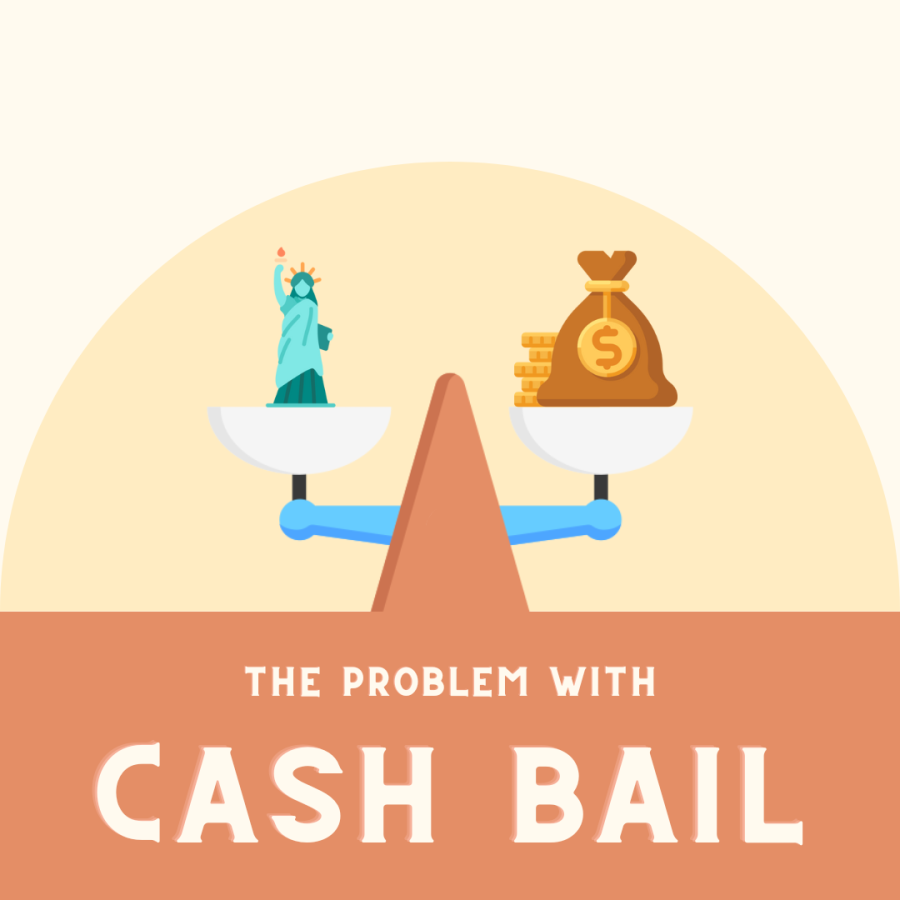The problem with cash bail
Despite the criticism, Illinois’ decision to reform cash bail is the right one.
March 5, 2023
Signed into law in February of last year, the Pretrial Fairness Act (PFA) aims to eliminate one of the most inconsistent and unjust aspects of the Illinois judicial system–cash bail.
Before addressing the content of the bill, it’s imperative that you understand the significance of the bail system and the profound effects it’s had on Americans for decades. At any given time in the last 10 years, you’ll find over 400,000 people being held pretrial in the US. For reference, that’s the entire population of Belize, stuck in a jail cell while still legally innocent. In any country–besides the US– that would be known as a “human rights violation.”
It may be difficult to visualize the significance of a statistic without first knowing just how serious being held pretrial is for the majority of Americans. A 2021 study by the Brookings Papers elucidated just that by explaining how an average citizen would lose about $30,000 in present value from a stay as short as 3 days. The average length of pretrial detention is 3 weeks.
A 2016 study by the Prison Policy Initiative found that the median income of detainees is around $18,655, so a loss of $30,000 is enough to devastate a family and continue the cycle of poverty and crime. Allowing the wealthy to opt out of due process seems rather un-American, yet the entire structure of the bail system seems to tell those with the money to afford bail that their crimes mean less.
Further systemic bias was evident in the most recent racial breakdown of the pretrial population, which showed that roughly 63% of the detainees were either Black or Latino.For anyone without prior knowledge of FBI statistics, that percentage is astronomically incongruent as that demographic only represents 32% of the larger populus.
Even for law-abiding citizens, cash bail results in a financial drain. Holding people is expensive, and that money comes straight from taxpayer dollars. These losses aren’t speculative either.
According to a study done by the Prison Policy Initiative, the annual cost of holding the more than 400,000 people currently in pretrial detention is roughly $13.6 billion. That’s around ten times the entire budget of the Illinois Department of Corrections, and enough to end homelessness in the United States — forever.
On the other hand, as some would argue, what’s the problem with paying a little extra for our safety? While their words are not devoid of a point, they miss the forest for the trees. Before investing your hard earned dollars, you need to make sure you’re getting your money’s worth.
Of the 70,283 people released pretrial in felony cases, IDOC statistics show that roughly 3% are then charged with new violent crimes. That percentage has remained relatively unchanged since the 90s. The risk presented is marginal by definition, but the politicization of violent crime has prescribed the public a pair of red-tinted glasses that paint the majority of criminals as animalistic savages. More often than not, these people are victims of a system that treats them like second class citizens, and the United States should be doing far more to preserve the civil rights of its people.
Cash bail has been a hotly contested idea for decades, and Illinois is far from the first to address it through legislation. Leading the charge is our nation’s capital, and in Washington DC, cash bail has been a seldom used tool for the better part of thirty years – with a 61% reduction in crime rate to show for it. Since the first waves of bail reform hit the Chicago area in 2017, the violent crime rates of people on pretrial release has dropped to 0.6%. Moreover, the percentage of felons who managed to accrue new charges dropped from 16.1% to 13.1%, indicating significant positive outcomes for the PFA and similar legislation regardless of location.
While the judicial system as a whole is an incredibly flawed and a corrupt testament to the incompetence of our government, reforming the cash bail system could still positively benefit millions of Americans for years to come. It seems naive to expect a chance of bipartisan congressional activity in any capacity, but a unifying force like the matter of one’s freedom could serve as an opportunity to produce real change for the public.
Historically ahead of the curve, state governments have clearly begun to realize the cultural value of legislation like the PFA. However, regardless of the issue at hand, the most important principle is that those who care about improving their communities vote in an informed manner. We’ve seen time and time again how much each individual vote matters, and nothing will ever be as important to a democracy than the will of the people.







